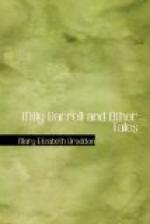We went from room to room, the dame throwing open the shutters of the deep-set gothic windows, and letting in a flood of sunshine upon the faded tapestries and tarnished picture-frames. It was a noble old place, and the look of decay upon everything was more in accord with its grandeur than any modern splendour could have been.
We had been through all the rooms on the ground floor, most of which opened into one another, and were returning towards the hall, when Mr. Darrell missed his wife, and sent me back to look for her in one direction, while he went in another. I hurried through three or four empty rooms, until I came to a small one at the end of the house, and here I found her. I had not noticed this room much, for it was furnished in a more modern style than the rest of the house, and the old housekeeper had made very light of it, hurrying us back to look at some armour over the chimneypiece in the next room. It was her master’s study, she had said, and was not generally shown to strangers.
It was a small dark-looking room, lined with dingily-bound books upon heavy carved-oak shelves, and with no other furniture than a massive writing-table and three or four arm-chairs. Over the mantelpiece, which was modern and low, there was a portrait of a young man with a dark handsome face, and it was at this that Augusta Darrell was looking. I could see her face in profile as she stood upon the hearth with her clenched hand upon the mantelpiece, and I had never before seen such an expression in any human countenance.
What was it? Despair, remorse, regret? I know not; but it was a look of keenest anguish, of unutterable sorrow. The face was deadly pale, the great gray eyes looking upwards at the portrait, the lips locked together rigidly.
She did not hear my footstep; it was only when I spoke to her that she turned towards me with a stony face, and asked what I wanted.
I told her that Mr. Darrell had sent me.
‘I was coming this instant,’ she said, resuming her usual manner with an effort. ’I had only loitered to look at that portrait. A fine face, is it not, Miss Crofton?’
‘A handsome one, at any rate,’ I answered doubtfully, for that dark haughty countenance struck me as rather repellent than attractive.
’That’s as much as to say you don’t think it a good face. Well, perhaps you are right. It reminded me of some one I knew a long time ago, and was rather interesting to me on that account. And then I fell into a kind of a reverie, and forgot that my dear husband might miss me.’
He came into the room as she was saying this. She told him that she had stopped to look at the portrait, and asked whose it was.
’It is a likeness of Angus Egerton, the present owner of the Priory,’ Mr. Darrell answered; ’and a very good likeness, too—of as bad a man as ever lived, I believe,’ he added in a lower voice.
‘A bad man?’




